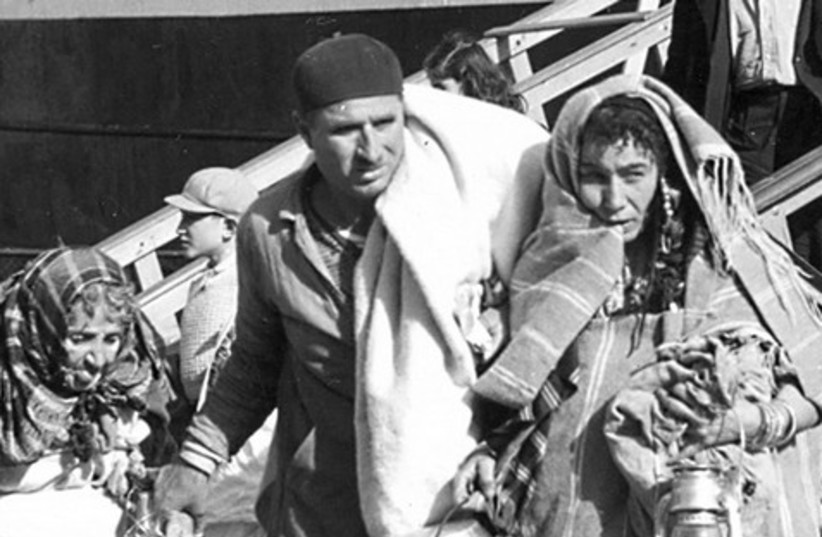US president Woodrow Wilson once said: “A nation which does not remember what it was yesterday, does not know what it is today, nor what it is trying to do.”
The Jewish nation has a long and storied history. Throughout its millennia-long Diaspora, Jews lived in different regions, among different cultures, speaking a variety of languages.
As a result of the reestablishment of Jewish sovereignty in our indigenous and ancestral land, Jews arrived from all over the world to share and take part in rebuilding the Jewish state.
Today, while much of the world sees the State of Israel as European in nature and culture, in fact, the majority of Israelis originate from the wider Middle East and North Africa (MENA) over the last few generations.
Unfortunately, while the culture and history of European Jewry is taught and imparted in Israel’s education system, that of Mizrahi Jewry is not.

As a British Jew raised in Baghdad with an extremely close connection and affection for Israel, I find this disconcerting because it feels like the erasure of our history.
From Iraq to Morocco, almost a million Jews fled or were forced out of their homes and communities in Arab countries during the 20th century, sometimes with little more possessions than our history, culture and identity.
Sadly, it seems that even those wonderful gifts are not being passed down to our children in Israel.
I recently commissioned a poll undertaken by Smith Consulting, one of Israel’s leading polling agencies, to understand how bad the situation really is.
Among the results of this extensive poll were that while 74% of all respondents said the history, heritage and culture of European Jewry is taught in the educational system to a large or somewhat large extent, only 14% could say the same about Mizrahi Jewry; 80% said it was either taught to a small extent or not at all.
Seventy-five percent of those polled said they could not recall any program or lesson in school that reinforced a positive perception of Mizrahi Jewry.
As an example of how little is known about MENA Jewish history, only 7% of respondents could identify the Farhud, a pogrom against the Jews of Iraq in 1941, when hundreds of Jews were slaughtered. But 58% could correctly identify Kristallnacht.
Nonetheless, despite these disappointing results, I was heartened that many in Israel seek change.
When asked whether the education system should teach the history and tradition of MENA Jews to a greater extent than is currently being taught, 57% of respondents said it should, and 55% said more hours should be dedicated to teaching these subjects in school curriculums.
In recent years, we have witnessed an understanding from Israeli politicians that there should be more done about this. Unfortunately, even those initiatives have not received the requisite backing.
Since 2014, according to a law passed by the Knesset, November 30 has been set aside as the Day of Commemoration for the Jewish Refugees from Arab Countries and Iran. But only 11% of those polled had heard of it.
This is not just a problem of imparting facts and history; this issue is important to strengthen Jewish and Zionist identity in Israel and around the world.
Today, many around the world believe Zionism is a foreign European colonialist enterprise, because much of the focus is on the European secular aspect of it and the idea that Zionism was invented by Theodor Herzl.
In fact, Zionism was espoused by Sephardi and Mizrahi rabbis and leaders ever since the First Temple’s destruction – from the Psalmist who wrote about sitting and weeping by the rivers of Babylon while remembering Zion, to Rabbi Yehuda Bibas, a scion of a long line of Moroccan rabbis and the person who developed modern political Zionism.
It was through Bibas’s student Rabbi Yehuda Alkalai – whose own student Simon Loeb Herzl (Theodor Herzl’s paternal grandfather) proudly acquired one of Alkalai’s books prescribing the immediate “return of the Jews to the Holy Land and renewed glory of Jerusalem” – that Theodor Herzl understood the Zionist plan of action enunciated in his books, articles and speeches.
It is history that teaches Jews our connection and attachment to a return to the Land of Israel is not new and not uniquely European. It demonstrates to the outside world that the Jews and our national ideas predated modern European nationalism.
It is not just in the field of politics, but in culture, philosophy, education, finance and many other disciplines that Mizrahi Jews and their history made their mark and have much to teach us.
We cannot afford as a people to forget our past, because it erases part of us, our identity and a large segment of our rich history and culture that sustained us over the years.
It is precisely this legacy that should be taught to the children of Israel and Jews around the world. Our national and religious identity is at stake when we leave large swathes out of our history.
The Jewish people have a special mission in the world, and Israel must be the center of that. However, it cannot achieve it if it is remiss about educating our children to their own history and culture.
The writer is a CBE (Commander of the Order of the British Empire), businessman and philanthropist, vice president of the World Organization of Jews from Iraq and honorary president of the Association of Jewish Academics from Iraq. His family charity’s education subsidiary, Dangoor Education, has supported many causes relating to education in the UK and Israel.
